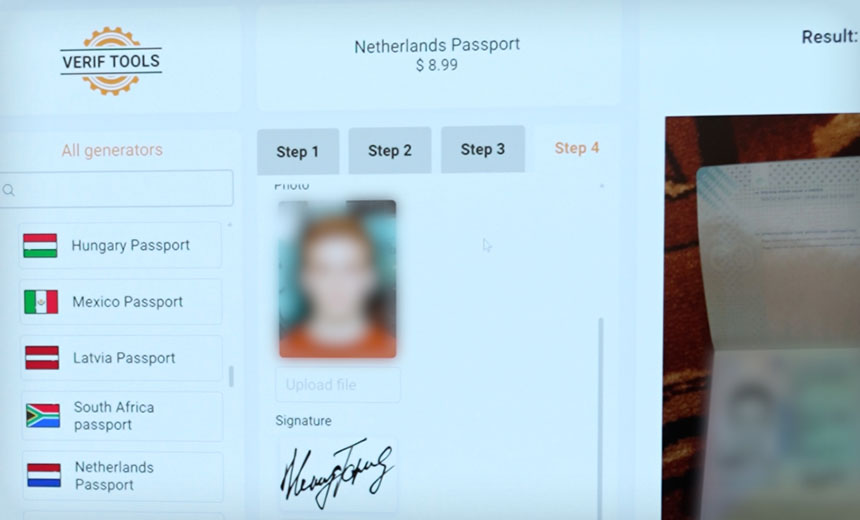Cybercrime as-a-service
,
Fraud Management & Cybercrime
,
Governance & Risk Management
FBI Seizes Domains; Dutch Police Analyzing Seized Data to Identify Admin and Users

A joint U.S.-Dutch law enforcement operation has shuttered VerifTools, a “key” provider of fake identification documents tied to help desk fraud, cryptocurrency theft and other cybercrime schemes. Authorities said the fake IDs generated by the platform have been repeatedly used to defeat identity verification systems, gain unauthorized access to online accounts and support numerous types of scams.
See Also: Identity and Access Management (IAM) Market Guide 2025
Dutch police on Wednesday accessed an Amsterdam data center to seize two physical servers and 21 virtual servers that they said powered the VerifTools Marketplace. Simultaneously, the FBI executed a U.S. District Court warrant to seize two domain names and a blog, all of which now resolve to a splash page with a law enforcement takedown notice.
“VerifTools is considered one of the largest platforms for generating images of fake IDs,” said Dutch National Police. “Users used these to circumvent security checks and disguise their true identities.”
The fake IDs have been used to facilitate numerous criminal schemes, authorities said. This has included phishing attacks, cases of help desk fraud, in which criminals pretend to be an employee of a legitimate organization, and rental fraud, involving scammers tricking victims into paying to rent a property that isn’t currently available or which doesn’t exist. In other cases, criminals used the images of fake IDs to bypass financial services firms’ “know your customer” verification checks.
Digital forensic investigators are now working to unmask whoever administered VerifTools as well as the platform’s many customers. “The website’s entire infrastructure, hosted on the servers, has been secured and copied,” Dutch police said. “This data is being investigated.”
Authorities said VerifTools was easy to use. “Visitors uploaded a passport photo, entered false information and then generated an image of a fake ID,” Dutch police said. “This image was downloaded after payment and then used to conceal someone’s true identity.”
Multiple law enforcement agencies, including in the Netherlands and Wales, have been probing the site.
The FBI launched its investigation in 2022 “after discovering a conspiracy to use stolen identity information to access cryptocurrency accounts,” the U.S. Department of Justice said. “The investigation revealed that VerifTools offered counterfeit identification documents for all 50 U.S. states and multiple foreign countries for as little as $9, payable in cryptocurrency.”
As part of its investigation, the bureau said it successfully generated and purchased fake New Mexico driver’s licenses using the platform, which it tied to at least $6.4 million in illicit profits.
“The removal of this marketplace is a major step in protecting the public from fraud and identity theft crime,” said Philip Russell, acting special agent in charge of the FBI’s Albuquerque division. “Together with our partners, we will continue to target and dismantle the platforms that criminals depend on, no matter where they operate.”
Besides fake passports for multiple countries and U.S. driver’s licenses, the site could also generate a variety of other types of fake IDs, including real-looking bank statements, invoices and residence permits.
Creating fake identification documents carries a maximum prison sentence of six years in the Netherlands.
Security experts said many different types of cybercrime continue to thrive thanks to a vibrant cybercrime-as-a-service economy that can supply not just fake IDs, but also a variety of other useful tools and infrastructure, including bulletproof servers, information-stealing malware, ransomware and more.
Law enforcement agencies continue to take aim not just at the individuals who use such tools, but also their suppliers. “The internet is not a refuge for criminals,” said Ryan Ellison, the acting U.S. attorney for the District of New Mexico. “If you build or sell tools that let offenders impersonate victims, you are part of the crime. We will use every lawful tool to disrupt your business, take the profit out of it and bring you to justice.”
Even so, not all users of platforms such as VerifTools were cybercrime practitioners. “Young people can also use these platforms to generate images of fake IDs, for example, to illegally enter a club,” Dutch police said. “They risk a lifelong criminal record.”
